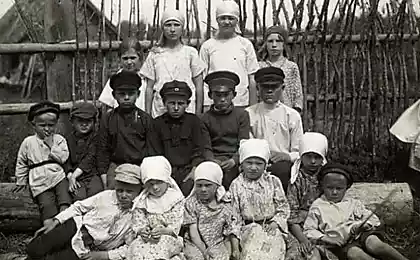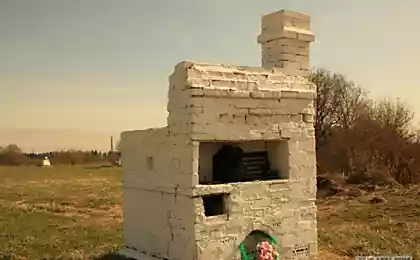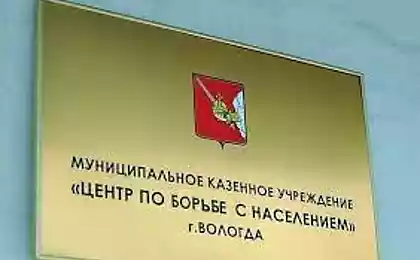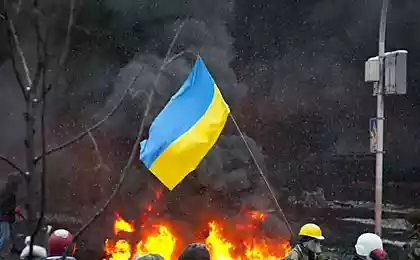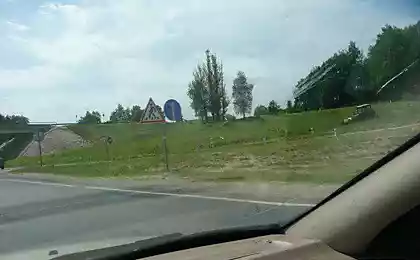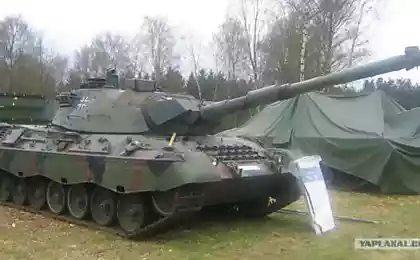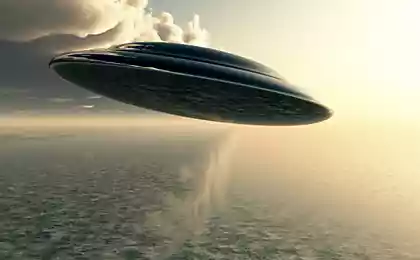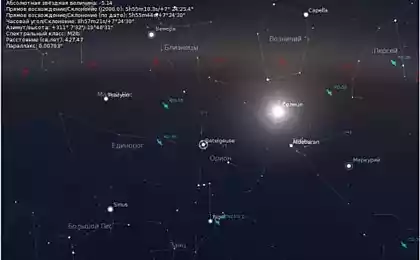774
Country Name Russian villages
Where in Russia elephants as live bottom and residents who are staying in the Buttermilk?
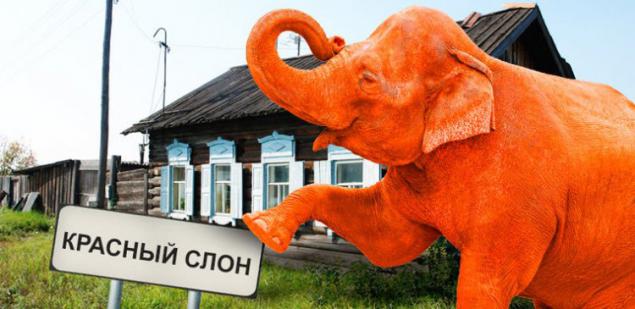
Red Elephant (Tver region)
Victor Pelevin argued that elephants in Russia more than a crow. It seems that the writer somewhat exaggerated, but in the Tver region did to the elephants are accustomed to both the mother and, in one form or another they constantly encountered.
So, in the village Zelenogorskiĭ Vyshnevolotsk district of Tver region until 1974 it was called the Red Elephant. History of the name is. Local plant based adjutant Nepokoychitskim, rice starch produced from Indian raw materials. In India, elephants certainly more than the crows, so it is an animal, and depicted on the box with the starch. The company was very well known - in 1894, for example, at an exhibition in Novgorod province products received a gold medal, and it had its own warehouses in Moscow, Warsaw and Odessa. Not surprisingly, the village was named after the plant elephant. After the revolution, the company away from the owners and then redeveloped in the production of juices and add to the title the word "Red". Time passed, and the authorities were surprised: what are the elephants in the Tver region? And the village was renamed in Zelenogorsk. But the elephants on the ground stubbornly translated. This animal is decorated with the emblem of the village, shop signs, there HOA "Red Elephant».
Red Elephant Village and elephant were once in the Yaroslavl region, but there are historians explain the prosaic name: Oslon used to be called the adaptation of poles to dry sheaves, and the letter "o" has long been lost.
Friday (Moscow Region)
Here you will not find Robinson Crusoe, wild goats and residues pirate treasure (which they, according to Daniel Defoe, surrounded Friday) but in excess of anglers, horse lovers, residents of cottages business class and other sufferers of nature. Around the village Friday Solnechnogorsk district, spaced 45 km from Moscow, is now a prestigious area (still, Istra reservoir!), And the occasional flare up the battle for the coastal territory.
There used to be a vibrant and life. At first the place was called Berendeevo - according to legend, because the settlement was founded by representatives of the Turkic nomadic tribe, inhabited here Yuri Dolgoruky. Then Berendeevo-Pyatnickoe, Friday-Berendeevo and finally just Friday. All these changes are tracked in 1389 (spiritual Merit Grand Prince Dmitry Ivanovich). Thus, in the scribe books for 1627 indicated that in the village there is a monastery of the great Nicholas the Wonderworker and the Holy Great Parascovia, narechennyya Friday. And every tenth Friday after Easter fairs were held in the village.
Fair tradition preserved in the XIX century: through the village held a lively path - Pyatnitskoe highway, which on market days attracts a lot of people. Traded barrels, pots, shingles, wooden toys, boots, and of course, the fruits of the harvest. The village grew and developed. By 1911, on Friday, there was a parish school, a library, a veterinary station, the local branch of the movement "guardianship of the national sobriety" (alongside a bench drinking), duplex st hospital. And after the Revolution Friday was the center of the surrounding villages. It had a post office, telegraph, club. Was created by the farm "New Way", in the 50s became a collective farm-millionaire. Villagers indulge in their performances the artists capital's theaters, including the choir Pyatnitsky.
Friday and is not from endangered villages. In it several streets in the evenings faithfully lighted lanterns, 86 households and 235 inhabitants.
Buttermilk (Nizhny Novgorod region)
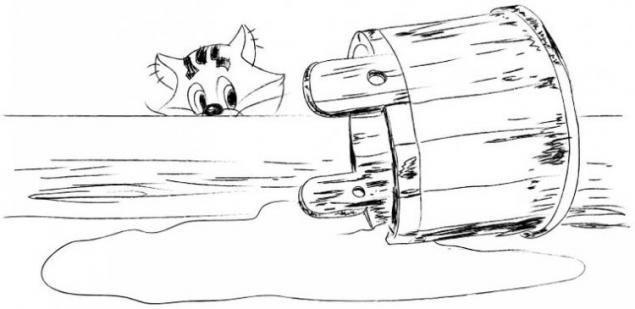
In the book, Eduard Uspensky, "Uncle Fyodor, dog and cat" Pechkin signed a letter: "The Postman village Buttermilk Pechkin Mozhaisk district." It is clear that in the years since the publication of the book in 1973, a lot of fans Matroskina balls and attempted to locate the scene prostokvashinskih holidays - did not happen. Not Mozhaisk district such villages. But the only Russian town named Buttermilk were found in the Tonkin region of Nizhny Novgorod region.
The village stands among the fields and forests. She has only one street with wooden houses and wells, cranes and 16 residents. But there is a story: three centuries ago after the church split, the Old Believers were hiding here. They founded a settlement. Well, if the name has arisen because of the spilled bucket of milk, sour quickly in the heat.
Deserted village was not always: there was oil mill, mill, stables and even farm "Shining Path," but all were closed, and people moved to the city. Now, all their aspirations to revive Buttermilk local authorities associated with the heroes of the book of the Assumption and the famous cartoons. Indeed, last winter on the occasion of the 30th anniversary of the cartoon "Winter in Buttermilk" actors arrived. We went down the street and sang to the accordion, "If it had not been winter," and then also showed a movie. And ten years ago, and that was trenchant: local artists from the Gallery atypical art conceived three days to live the life of Uncle Theodore, Sharik and Matroskin. Settled in a house on the outskirts, painted furniture in different colors, "photo hunting" for chickens and other domestic animals, walked with suitcases of mushrooms, "to buy something unnecessary," knocking on every house, and then decorated it "unnecessary" tree . Miscellaneous honor postman Pechkin the cottages fresh press, the artists left for the city - to mount a film about the "rustic Biennale", and residents were relieved, and began to tell visiting for the summer urban grandchildren how to take part in art shares and starred in this film.
Mama (Irkutsk region)
Mom to the village, located in the most beautiful, but hard to reach places in the mouth of the same river, on the border with Yakutia, is not so easy to get - only with air. We had to build its own airport and flies to Irkutsk. Products and equipment transported on barges along the rivers. Well, this so important for the mother that she needed regular flights? But here's the thing. More in 1689 "Cossack Fools Parsley find sluduyuschy on Vitim River," and in the 1700-m "rudosysknyh Affairs dozorschiki" Peter I made a petition to grant them a salary for the sovereign "Sludnykh" fishing. Nevertheless, a permanent settlement was established only in 1928. Industrial development of the field and started in Soviet times. By the 1950s, it is remote from civilization, the place has become for many the center of the universe and a true paradise on earth. Mining and Processing Plant "Mamslyuda" was the only Russian manufacturer of mica-muscovite and worked for the needs of the military industrial complex.
Mica, mica boards for the electronics industry, mica dust cover of which allows to withstand high temperature and pressure - all delivered mamchane the mainland and themselves in the loser has not. There was a brewery with excellent beer in the store - different varieties of cheeses, sausages, and other scarce goods, which in the Union common people he has never seen. And the salary? While in Moscow the salary engineer was, for example, 120 rubles., A prospector in the past month could earn several thousand. According to the recollections of old residents on artisanal work from Irkutsk came academicians and generals.
Prosperity ended, together with the restructuring. Purchases mica decreased, respectively, began to arrest the salary, and people - to leave. The plant went bankrupt. Now in the village of about 3,200 inhabitants. There is still a mineralogical museum with half a century of history and a rich collection of stones. Only it will not expose all - sex, they say, begins to sag dangerously. Despite all the difficulties, and still operates the airport Mama: Mama air travel for residents of Chui region on Tuesdays, Thursdays and Sundays - the only way of communication with the regional center.
Incidentally, the name comes from the mother Evenki word "MoMA" ("mo" - a tree, "ma" - the suffix indicating the material and color), meaning "wooden", "woody", that is wooded.
Bottom (Pskov region)
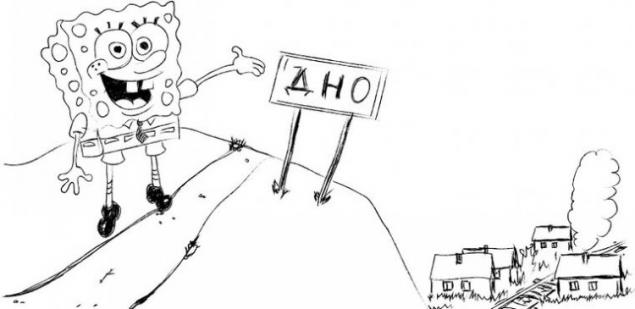
No, the characters of the play "The Lower Depths" Gorky did not live here. At the bottom of the city has its own long history. The bottom of the Big Village and less than Shelonsky fifths Donets Novgorod land mentioned in scribe books at the beginning of the XV century. Within less than a century on the Donets had not heard. According to one version, the whole village died during the plague in 1550, second - peacefully joined the Big Bottom, owned by the landowner Athanasius Belsky, a relative Malyuta Skuratov. By the end of the XIX century the village grew to 600 inhabitants, and in 1925 and became a town at all - after the construction of railways Bologoe - Pskov and St. Petersburg - Vitebsk. The local station is located at the intersection of the steel highways has become a node. So transit here have visited many.
In Soviet textbooks written that in 1917 the station bottom of Nicholas II signed the abdication - in honor of this event near the station, even a memorial cross. However, this was denied: Entries king Bottom mentioned only as one of the points of the route, the very same renunciation took place in the carriage royal train in Pskov. But no one disputes the little dog stay here Marshak's poem "The Lady in the baggage handed over»:
Enough station Bottom:
Lost one place.
Frightened considered luggage:
Sofa, suitcase, bag,
The painting, basket, cardboard,
Comrades, where dog?
The main attraction of the city - certainly Station. It was built instead of wooden in 1949 in the style of Stalin's Empire style, with a tower, spire, arched windows - all as it should. Station "island" - is located between the paths. One side called Vitebsk, the second - Bologovsky. In the middle, a white frame moldings, proud inscription "bottom" (incidentally, the name of the decline is not accepted). Another of the curiosities here sits Lenin monument. Old-timers say that the original sculpture in the park was a pair: around Lenin, Stalin stood symbolically leaning on the shoulder of senior fellow. Then, according to the trend of the times, sawed off Stalin and Lenin and remained seated.
But let us return to the title, the intrigue of many - why the bottom? It's simple. The city is located in Shelonsky lowlands, and the word "bottom" among others in Russian means "the base of the depressions, any depressions on the surface of the earth."

Red Elephant (Tver region)
Victor Pelevin argued that elephants in Russia more than a crow. It seems that the writer somewhat exaggerated, but in the Tver region did to the elephants are accustomed to both the mother and, in one form or another they constantly encountered.
So, in the village Zelenogorskiĭ Vyshnevolotsk district of Tver region until 1974 it was called the Red Elephant. History of the name is. Local plant based adjutant Nepokoychitskim, rice starch produced from Indian raw materials. In India, elephants certainly more than the crows, so it is an animal, and depicted on the box with the starch. The company was very well known - in 1894, for example, at an exhibition in Novgorod province products received a gold medal, and it had its own warehouses in Moscow, Warsaw and Odessa. Not surprisingly, the village was named after the plant elephant. After the revolution, the company away from the owners and then redeveloped in the production of juices and add to the title the word "Red". Time passed, and the authorities were surprised: what are the elephants in the Tver region? And the village was renamed in Zelenogorsk. But the elephants on the ground stubbornly translated. This animal is decorated with the emblem of the village, shop signs, there HOA "Red Elephant».
Red Elephant Village and elephant were once in the Yaroslavl region, but there are historians explain the prosaic name: Oslon used to be called the adaptation of poles to dry sheaves, and the letter "o" has long been lost.
Friday (Moscow Region)
Here you will not find Robinson Crusoe, wild goats and residues pirate treasure (which they, according to Daniel Defoe, surrounded Friday) but in excess of anglers, horse lovers, residents of cottages business class and other sufferers of nature. Around the village Friday Solnechnogorsk district, spaced 45 km from Moscow, is now a prestigious area (still, Istra reservoir!), And the occasional flare up the battle for the coastal territory.
There used to be a vibrant and life. At first the place was called Berendeevo - according to legend, because the settlement was founded by representatives of the Turkic nomadic tribe, inhabited here Yuri Dolgoruky. Then Berendeevo-Pyatnickoe, Friday-Berendeevo and finally just Friday. All these changes are tracked in 1389 (spiritual Merit Grand Prince Dmitry Ivanovich). Thus, in the scribe books for 1627 indicated that in the village there is a monastery of the great Nicholas the Wonderworker and the Holy Great Parascovia, narechennyya Friday. And every tenth Friday after Easter fairs were held in the village.
Fair tradition preserved in the XIX century: through the village held a lively path - Pyatnitskoe highway, which on market days attracts a lot of people. Traded barrels, pots, shingles, wooden toys, boots, and of course, the fruits of the harvest. The village grew and developed. By 1911, on Friday, there was a parish school, a library, a veterinary station, the local branch of the movement "guardianship of the national sobriety" (alongside a bench drinking), duplex st hospital. And after the Revolution Friday was the center of the surrounding villages. It had a post office, telegraph, club. Was created by the farm "New Way", in the 50s became a collective farm-millionaire. Villagers indulge in their performances the artists capital's theaters, including the choir Pyatnitsky.
Friday and is not from endangered villages. In it several streets in the evenings faithfully lighted lanterns, 86 households and 235 inhabitants.
Buttermilk (Nizhny Novgorod region)

In the book, Eduard Uspensky, "Uncle Fyodor, dog and cat" Pechkin signed a letter: "The Postman village Buttermilk Pechkin Mozhaisk district." It is clear that in the years since the publication of the book in 1973, a lot of fans Matroskina balls and attempted to locate the scene prostokvashinskih holidays - did not happen. Not Mozhaisk district such villages. But the only Russian town named Buttermilk were found in the Tonkin region of Nizhny Novgorod region.
The village stands among the fields and forests. She has only one street with wooden houses and wells, cranes and 16 residents. But there is a story: three centuries ago after the church split, the Old Believers were hiding here. They founded a settlement. Well, if the name has arisen because of the spilled bucket of milk, sour quickly in the heat.
Deserted village was not always: there was oil mill, mill, stables and even farm "Shining Path," but all were closed, and people moved to the city. Now, all their aspirations to revive Buttermilk local authorities associated with the heroes of the book of the Assumption and the famous cartoons. Indeed, last winter on the occasion of the 30th anniversary of the cartoon "Winter in Buttermilk" actors arrived. We went down the street and sang to the accordion, "If it had not been winter," and then also showed a movie. And ten years ago, and that was trenchant: local artists from the Gallery atypical art conceived three days to live the life of Uncle Theodore, Sharik and Matroskin. Settled in a house on the outskirts, painted furniture in different colors, "photo hunting" for chickens and other domestic animals, walked with suitcases of mushrooms, "to buy something unnecessary," knocking on every house, and then decorated it "unnecessary" tree . Miscellaneous honor postman Pechkin the cottages fresh press, the artists left for the city - to mount a film about the "rustic Biennale", and residents were relieved, and began to tell visiting for the summer urban grandchildren how to take part in art shares and starred in this film.
Mama (Irkutsk region)
Mom to the village, located in the most beautiful, but hard to reach places in the mouth of the same river, on the border with Yakutia, is not so easy to get - only with air. We had to build its own airport and flies to Irkutsk. Products and equipment transported on barges along the rivers. Well, this so important for the mother that she needed regular flights? But here's the thing. More in 1689 "Cossack Fools Parsley find sluduyuschy on Vitim River," and in the 1700-m "rudosysknyh Affairs dozorschiki" Peter I made a petition to grant them a salary for the sovereign "Sludnykh" fishing. Nevertheless, a permanent settlement was established only in 1928. Industrial development of the field and started in Soviet times. By the 1950s, it is remote from civilization, the place has become for many the center of the universe and a true paradise on earth. Mining and Processing Plant "Mamslyuda" was the only Russian manufacturer of mica-muscovite and worked for the needs of the military industrial complex.
Mica, mica boards for the electronics industry, mica dust cover of which allows to withstand high temperature and pressure - all delivered mamchane the mainland and themselves in the loser has not. There was a brewery with excellent beer in the store - different varieties of cheeses, sausages, and other scarce goods, which in the Union common people he has never seen. And the salary? While in Moscow the salary engineer was, for example, 120 rubles., A prospector in the past month could earn several thousand. According to the recollections of old residents on artisanal work from Irkutsk came academicians and generals.
Prosperity ended, together with the restructuring. Purchases mica decreased, respectively, began to arrest the salary, and people - to leave. The plant went bankrupt. Now in the village of about 3,200 inhabitants. There is still a mineralogical museum with half a century of history and a rich collection of stones. Only it will not expose all - sex, they say, begins to sag dangerously. Despite all the difficulties, and still operates the airport Mama: Mama air travel for residents of Chui region on Tuesdays, Thursdays and Sundays - the only way of communication with the regional center.
Incidentally, the name comes from the mother Evenki word "MoMA" ("mo" - a tree, "ma" - the suffix indicating the material and color), meaning "wooden", "woody", that is wooded.
Bottom (Pskov region)

No, the characters of the play "The Lower Depths" Gorky did not live here. At the bottom of the city has its own long history. The bottom of the Big Village and less than Shelonsky fifths Donets Novgorod land mentioned in scribe books at the beginning of the XV century. Within less than a century on the Donets had not heard. According to one version, the whole village died during the plague in 1550, second - peacefully joined the Big Bottom, owned by the landowner Athanasius Belsky, a relative Malyuta Skuratov. By the end of the XIX century the village grew to 600 inhabitants, and in 1925 and became a town at all - after the construction of railways Bologoe - Pskov and St. Petersburg - Vitebsk. The local station is located at the intersection of the steel highways has become a node. So transit here have visited many.
In Soviet textbooks written that in 1917 the station bottom of Nicholas II signed the abdication - in honor of this event near the station, even a memorial cross. However, this was denied: Entries king Bottom mentioned only as one of the points of the route, the very same renunciation took place in the carriage royal train in Pskov. But no one disputes the little dog stay here Marshak's poem "The Lady in the baggage handed over»:
Enough station Bottom:
Lost one place.
Frightened considered luggage:
Sofa, suitcase, bag,
The painting, basket, cardboard,
Comrades, where dog?
The main attraction of the city - certainly Station. It was built instead of wooden in 1949 in the style of Stalin's Empire style, with a tower, spire, arched windows - all as it should. Station "island" - is located between the paths. One side called Vitebsk, the second - Bologovsky. In the middle, a white frame moldings, proud inscription "bottom" (incidentally, the name of the decline is not accepted). Another of the curiosities here sits Lenin monument. Old-timers say that the original sculpture in the park was a pair: around Lenin, Stalin stood symbolically leaning on the shoulder of senior fellow. Then, according to the trend of the times, sawed off Stalin and Lenin and remained seated.
But let us return to the title, the intrigue of many - why the bottom? It's simple. The city is located in Shelonsky lowlands, and the word "bottom" among others in Russian means "the base of the depressions, any depressions on the surface of the earth."




